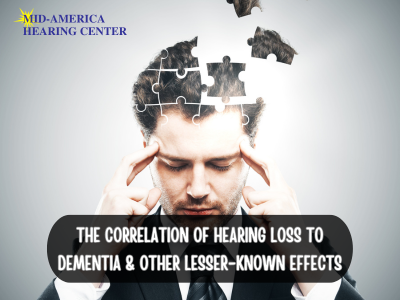Our Hearing Blog

THE CORRELATION OF HEARING LOSS TO DEMENTIA & OTHER LESSER-KNOWN EFFECTS
In recent years, researchers and medical professionals have discovered alarming evidence and the correlation between hearing loss and dementia. Many of us know that hearing loss is a prevalent sensory impairment that affects millions of people worldwide. It can occur due to various factors, including aging, exposure to excessive noise, certain medical conditions, and genetic predispositions. Over time, untreated hearing loss can lead to social isolation, communication difficulties, a diminished quality of life and a more profound implication as it is connected to cognitive decline and dementia.
While the impact of hearing loss on communication and cognitive function is widely recognized, there are several lesser-known effects of hearing loss on an individual's health and well-being.
Here are a few...
1) Mental Health: Hearing loss has been linked to an increased risk of mental health issues such as depression, anxiety, and social isolation. The communication difficulties and the strain of constantly trying to hear and understand can lead to feelings of frustration, loneliness, and reduced self-esteem.
2) Physical Health: Studies have found correlations between hearing loss and various physical health conditions. Individuals with untreated hearing loss may be at a higher risk of falls and accidents due to reduced spatial awareness and difficulties with balance. Additionally, some research suggests that hearing loss may be associated with cardiovascular disease, diabetes, and an increased risk of hospitalization.
3) Cognitive Decline: Beyond the connection to dementia, untreated hearing loss has been linked to accelerated cognitive decline and an increased risk of developing mild cognitive impairment (MCI). MCI is a condition characterized by memory and cognitive deficits that are greater than expected for age but not severe enough to be classified as dementia.
4) Relationship Strain: Hearing loss can strain relationships, both personal and professional. Communication breakdowns can lead to misunderstandings, frustration, and increased conflict within families, friendships, and workplaces. It may become challenging to participate fully in social activities and maintain meaningful connections with others.
5) Reduced Quality of Life: Hearing loss can significantly impact an individual's overall quality of life. It can limit participation in social activities, affect job performance and career opportunities, and hinder personal growth and fulfillment. Untreated hearing loss may lead to a decreased enjoyment of hobbies, interests, and even simple everyday activities.
6) Cognitive Load and Fatigue: Constantly straining to hear and make sense of sounds can be mentally exhausting. Individuals with hearing loss often experience increased cognitive load, as they must put in extra effort to follow conversations and fill in the gaps caused by missed auditory information. This cognitive fatigue can contribute to decreased productivity, mental exhaustion, and overall reduced well-being.
7) Tinnitus: Many individuals with hearing loss also experience tinnitus, a persistent ringing, buzzing, or other phantom sounds in the ears. Tinnitus can be distressing and interfere with concentration, sleep, and overall quality of life.
It is crucial to recognize and address these lesser-known effects of hearing loss. Seeking early intervention, such as hearing aids or other assistive devices, can help mitigate these impacts and improve overall health and well-being. Additionally, providing support, education, and understanding to individuals with hearing loss can contribute to a more inclusive and supportive environment. There is growing optimism regarding the potential for intervention. Early detection and treatment of hearing loss may not only enhance communication and quality of life but also help reduce the risk of cognitive decline and dementia.
Hearing aids, for instance, have shown promise in improving cognitive function and slowing down the progression of cognitive decline in individuals with hearing loss. The brain is a remarkably simple “use it or lose it” mechanism, and auditory input can help to provide the proper, constant stimulation our brains are accustomed to and designed to receive. Pertinent studies all indicate that when hearing aids are appropriately fit, they will considerably improve quality of life, personal relationships, better psychological wellbeing, and higher incomes. Treating early will also reduce the risk of other health problems related to hearing loss including, but not limited to, diabetes, dementia, dizziness or balance issues, heart disease and falls. In fact, 95% of hearing aid users said that their overall life improved as well as their personal relationships.
You have put it off long enough, it's time to get appropriate support and treatment for you or your loved one's hearing loss. At Mid-America hearing Center, we can strive toward improving both hearing and cognitive health outcomes, ultimately enhancing the overall well-being and lifestyle many are missing out on. We're here to address your needs in the most caring way possible, starting with your first appointment, where you receive a FREE Hearing test and Cognitive screening. From there you’ll have a better understanding of what you need to improve your hearing and decide what will work best for you.
Blog Archive

